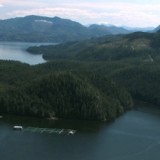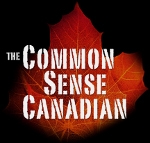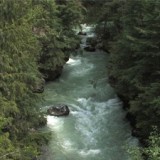Our readers should know the position of The Common Sense Canadian. In a word, the environment is the #1 issue before the people of British Columbia, indeed the world. If we lose our farmland, our precious salmon, and our rivers, what’s left?
Money?
How do you make money out of farms that aren’t there any more so you have to import your food?
How do make money out of salmon that are killed by lice from fish farms? Especially when all the profit goes out of province, mostly to Norway?
How do you make money destroying rivers and the delicate ecosystems they’re part of, to make power we don’t need, especially when we subsidize out-of-province companies who take all the profits and much more elsewhere?
How do you make money with a pipeline with someone else’s oil-or black sludge as The Tar sands produce – across delicate wildlife habitat, 1000+ rivers streams and agricultural land when a rupture would wreak incalculable damage-knowing that the pipeline company, Enbridge, is notorious for its negligence?
How do we profit from exposing our delicate coast to tankers carrying this stuff? Have we learned nothing from the Exxon Valdez?
And where’s the profit in taking a huge ever-increasing risk in piping oil to Burnaby to be taken thence, through the two dangerous narrows in Vancouver harbour out through the Salish Sea and through the treacherous Juan de Fuca?
There is no amount of money in the world that makes these risks, indeed certainties, worthwhile.
We stand firmly for help to the disadvantaged, improved healthcare, aid to the homeless, and better education-but how can we do that if we have to import more and more of our food?-if we toss away not only the commercial sale of fish but the significant domestic and tourist use of that resource?-if we subsidize foreign companies to provide electricity for themselves, bankrupting our jewel, BC Hydro, in the bargain?
The long and the short of it is we cannot prosper by wiping out our natural resources-in fact we commit fiscal suicide and abandon our children’s heritage.
This means that The Common Sense Canadian will support candidates or parties based not on their political philosophy, but on their commitment to saving our environment-not just because it’s beautiful but because to do otherwise is fiscal madness.
Does a labourer, a small business person, someone in need, the sick, the elderly, the unemployed-or even the well off for that matter-win if the party they support ruins our environment?
No matter how smart you are with money, you can never make up fiscally or spiritually for the loss of the environment.
It’s not too soon to be looking ahead to the May 2013 election. We at The Common Sense Canadian are already campaigning and will do so full time until the election.
In the next few months we’ll learn a lot about who is going to be promising what.
With the Liberals it’s hard to see who can pull them out of their political quicksand. Will Carole Taylor be dragooned into seeking the leadership? Will it be Christy Clark? Mike DeJong? Kevin Falcon? George Abbott? An unknown?
Carole Taylor can’t escape responsibility for the disastrous Liberal policy towards farmland, fish farms, and energy. She would have to make pledges that would cost her support from industry and Ms. Taylor knows something about money matters and that you don’t get campaign funds unless you’re prepared to pay the piper.
Christy Clark is more to blame than Ms. Taylor, for she, after all, has had three years with her own talk show to support our environment before a large, daily audience. Rather than holding the Campbell government accountable, she has uncritically supported her old cronies the Liberal Party to which she’s joined at the hip. As for all other cabinet ministers, they, too, supported the utter desecration of our environment for the profit of their political friends.
The NDP is in the process of devouring each other but then it’s always been a nest of adders that rarely sheath their fangs. Even at the testimonial to Dave Barrett last Saturday you could sense the unsettled conditions. The question in the NDP, in case you’ve been on Mars for the past couple of years, is whether or not Carole James can win. It never seems to dawn on them that she might lose because they can’t get their act together.
The Carole James I saw in her press conference last week when she took the best the media could throw at
her and batted pitch after pitch out of the park, showed toughness not much seen before. It was the same at the tribute for Barrett-she didn’t beat about the bush and made it clear that she was in the fight to stay.
If she can maintain that steely determination and get her venomous adders targeted on Liberals rather than themselves, she could be tough to beat.
There are deep rumblings of a third party to take the place of the old Socreds, a party which under the Bennetts, père et fils, staked out the middle ground where most of the people of BC are politically. If it happens, it will badly hurt the Liberals by capturing the “centre” (abandoned by Campbell), while helping the Conservatives to steal their “right wing” support. The two we hear most about are Gordon Wilson and Chris Delaney, both decent men with an excellent grasp on issues-the edge perhaps going to
Wilson because of his electoral and cabinet experience.
What then does The Common Sense Canadian look to?
Four things:
1. A re-commitment to protecting
farmland, a “commitment that commits them to keep to their
commitment”.
2. A closure of all fish farms in
our oceans especially near routes of migrating Pacific salmon while encouraging
dry land operations.
3. A commitment to keep our precious coast free of Tar Sands oil supertankers from the proposed Enbridge pipeline and Kinder-Morgan expansion
4. A commitment to end all
licensing of private power construction, PLUS-and this is critical-making
public all private power contracts in existence, coupled with a flat refusal to
honour any which are unconscionable.
Carole James has shown a lamentable reluctance to pledge this in the name of “sanctity of contract” and
no doubt out of fear of losing support from business.
We put it to her and other political hopefuls this way: suppose you were running for mayor in a town run by a “Boss Tweed” on a ticket of cleaning up the city. If you won would you continue the unconscionable deals the old council had made with the mayor’s brother-in-law and other cronies which screamed of lining the pockets of friends and supporters? Of course not!
These private power contracts can’t pass the “smell test”-can they pass the “unconscionable” test?
How can it be conscionable to force our own power company, BC Hydro, to buy power that they don’t need, meaning that they must either sell it at a 50%+ loss or use it at 12 times the price they can make it themselves?
Surely these private power so called “contracts” must be made public so that we can see just what Campbell & Co. did, and if they’re unconscionably unfair to the public, be able to rescind them.
We always hear from the corporate giants that if we as a province don’t honour contracts with foreign investors, they won’t come to BC.
Really? Are they saying we should, in order to have their business, let them fleece the taxpayers? Is it their
position that crooks are welcome?
No one is saying that if the private companies simply got a better deal than we would have made that they should be rescinded. But if, as we suspect, BC Hydro is forced to buy power at twice or more what it’s worth, or 12 times as costly as Hydro can make it for itself, does this mean we can’t state the obvious, namely that we were cheated?
Shouldn’t any companies wanting to do business in BC know, right up front, that we will not put up with any more
“sweetheart deals” made by corrupt governments?
Surely even the Fraser Institute, that rightwing “think” tank whose advice Campbell uncritically
accepts, would agree that these contracts should see the light of day, and surely the captains of industry don’t beleive that anyone, a person, a company, or a crown corporation, should be bound by an unconscionable contract
forced upon them.
If these private energy deals are like those given to “Boss Tweed’s” brother-in-law, would any decent person of whatever political stripe or walk of life say that a new, honest government must bankrupt its prize possession because the previous government made a corrupt deal?
We, at The Common Sense Canadian (www.thecanadian.org) ay an emphatic NO! font-family:Arial;mso-bidi-font-
There we have it-The Common Sense Canadian says simply this: While we support all who fight to save our environment, to use the business term, the bottom line, is that in addition to our moral responsibility to leave our environment to generations to come, risking our environment is the height of fiscal irresponsibility.
*Boss Tweed-was an American politician most notable for being the “boss” of Tammany Hall, the Democratic Party political machine that played a major role in the politics of 19th century New York City and State.








